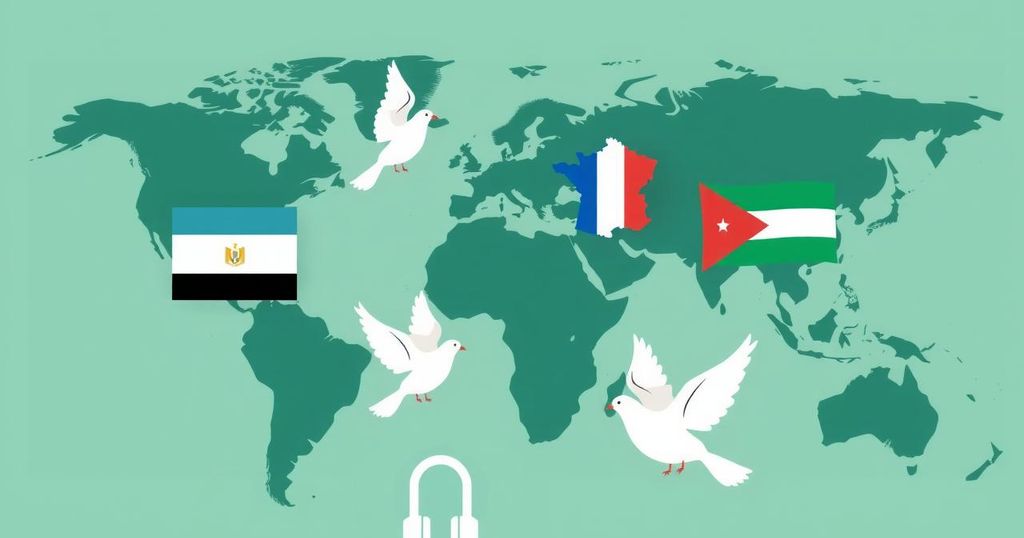Tropical Cyclone Chido: Flash Update No. 1 on the Humanitarian Impact in Southern Africa as of December 13, 2024
Tropical Cyclone Chido is affecting approximately 2.7 million people across Southern Africa, with significant detrimental impacts expected in Madagascar, Mozambique, and Malawi. The cyclone has prompted emergency preparedness measures including community advisories, pre-positioning of humanitarian supplies, and proactive response actions in anticipation of severe weather conditions. High winds and heavy rainfall pose risks of flooding and damage, necessitating comprehensive coordination and response efforts from governmental and humanitarian entities in the region.
Tropical Cyclone Chido has significantly impacted six countries in Southern Africa, with an estimated 2.7 million individuals affected, particularly in Madagascar, Mozambique, and Malawi. The cyclone, which intensified to Category 4 but weakened to Category 3, is predicted to maintain its intensity while approaching Madagascar and Mozambique, where heavy rainfall and strong winds are anticipated. Preparatory efforts include issuing advisories to vulnerable communities, pre-deploying humanitarian assistance, and activating emergency plans. More heavy rainfall is expected in various Southern African countries due to Chido and other weather systems, prompting concerns over potential flooding and damage to infrastructure. In the wake of the cyclone, humanitarian agencies are mobilizing resources and conducting assessments to support affected populations efficiently.
On the morning of December 13, Cyclone Chido was located approximately 159 km north of Madagascar and is projected to make landfall in Mozambique on December 15. The Mozambique provinces of Cabo Delgado and Nampula are particularly at risk, with forecasts suggesting intense rainfall and winds exceeding 120 km/h. The cyclone poses substantial threats of flooding, especially in regions where additional weather systems are expected, increasing vulnerability among local populations.
Emergency response measures are being implemented across the region, including activating crisis response cells in impacted areas, prepositioning vital supplies, and coordinating evacuations where necessary. As organizations prepare for the potential consequences of Chido, public awareness campaigns are underway in collaboration with local authorities and humanitarian partners to inform communities about safety measures and preparatory steps. Agencies like UNICEF and the Comorian Red Cross are playing crucial roles in response efforts by mobilizing resources and ensuring effective communication. Overall, robust coordination and timely actions are critical to mitigating the impact of Cyclone Chido across the region.
Meanwhile, governmental efforts in Malawi are focused on issuing advisories for individuals to move to higher ground and preparing Emergency Operations Centres ahead of landfall. The Ministry of Natural Resources and Climate Change is actively guiding residents about securing their properties against strong winds and flooding. The rapid response capacity in these affected sectors is crucial to minimizing adverse outcomes from the cyclone’s devastation and ensuring vulnerable communities remain informed and prepared.
The passage of Tropical Cyclone Chido poses substantial risks to Southern Africa, with approximately 2.7 million individuals projected to be impacted across multiple countries. Cyclones in this region historically lead to significant humanitarian challenges, including destruction of infrastructure, displacement, and health crises. Understanding the trajectory, intensity, and anticipated impact of Chido is essential for effective emergency preparedness and response. Previous cyclones Gombe and Freddy highlighted the need for proactive measures in the face of severe weather events, making the current situation particularly urgent for response organizations and governmental authorities. Agencies are actively mobilizing resources, conducting public awareness campaigns, and implementing contingency plans to address the impending challenges posed by Chido. Coordination and prompt dissemination of information are paramount in ensuring communities are prepared for the potential effects of the cyclone.
The ongoing situation regarding Tropical Cyclone Chido remains critical, affecting millions across Southern Africa. With severe weather conditions anticipated, urgent action by governments, humanitarian organizations, and local communities is crucial for mitigating impacts. Preparedness efforts encompass public education, evacuation protocols, and significant mobilization of resources to ensure those at risk are supported. Continuous monitoring and updates will be essential for effective response as Cyclone Chido approaches landfall, with authorities prioritizing safety and coordination across all impacted sectors.
Original Source: reliefweb.int




Post Comment